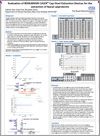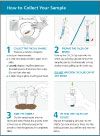Direct Patient Faecal Sampling with CALEX®
Revolutionises Workflow for Calprotectin Testing
The introduction of the CALEX® Cap faecal extraction device, in 2014, transformed sample preparation for calprotectin testing.
It brought convenient, safe stool preparation and optimised dilution of the stool sample, for maximum extraction efficiency.
Now, CALEX patient packs are available to enable the patient to directly prepare the CALEX themselves. It can then be sent to the laboratory, rather than supplying a stool sample in a container.
This will release huge amounts of resource in the laboratory, enhancing the workflow even further.
Benefits
Rapid, Clean & Consistent Sample Preparation Every Time
Users of the BÜHLMANN range of faecal calprotectin assays and fPELA (elastase) assay can improve efficiency and laboratory workflow with the CALEX® Cap direct patient sampling kits:
Receiving the ready prepared CALEX, rather than a stool sample that requires further processing for extraction, will release huge amounts of resource in the laboratory, transforming the workflow.
UKCA marked packs
On receipt in the lab the CALEX is ready to vortex, centrifuge and load onto the analyser for testing
Sample is stable for 7 days at ambient (vs. 3 days for stool samples)
Results correlate with lab prepared CALEX
Patient acceptance is high
CALEX is suitable for safe air and land transportation according to IATA 650 (UN3373) regulations
CALEX® Faecal Calprotectin At Home Sample Collection Kit

CALEX Cap is the first and only stool extraction device suitable for air and land transportation according to IATA 650 (UN3373) regulations.
This allows the option to outsource pre-analytics to the patient’s home, increasing safety for laboratories and revolutionising speed, efficiency and cost savings in the stool testing workflow.
With the CALEX Faecal Calprotectin Sample Collection Kit it is possible to keep stool samples away from the laboratory and measure faecal calprotectin and p-elastase from ready-to-use extracts using the high quality BÜHLMANN assays.
The kit CALEX-CAL-CK020 is UK CA IVD certified.
Patient Friendly Kits
Each kit is discretely packaged in a business style envelope with a CALEX extraction device, a patient specific instructions for use leaflet (IFU), with integral label (name, DOB and sample collection date). A clear grip seal bag is also included, for return of the CALEX and the request form back to the laboratory or GP.
The IFU is written in lay terms and has guidance on taking the sample, simple to follow instructions with diagrams and a link to a video to support the correct usage of the CALEX with different sample consistencies.
The kits come in boxes of 20 and are stored at ambient temperature. Shelf life on receipt is generally 12 – 18 months, so that kits can be sent out to clinics and primary care in quantities and conditions that will minimise wastage. The boxes have a dispensing tally on the front to help maintain the correct level of stock within individual locations. Hospitals can order the kits through Alpha Laboratories and send them to clinics and primary care using their existing van delivery/sample collection services. Alternatively, kit packs can be sent directly to individual locations using The Alpha Portal.
Step by Step Guide for Patients
Sample Stability
Calprotectin Stability
One of the biggest issues with calprotectin testing is the variable rates of degradation that occur within the stool sample. This is demonstrated in a stability study, in a paper published by Lasson in 2014 (Journal of Crohns & Colitis) showing individual samples to have significantly different rates of degradation. The overall conclusion from this publication, and the widely accepted premise, is that calprotectin is stable at ambient in a stool sample for three days. Within the data, however, whilst some samples are relatively stable, others lose between 30 – 50% of detectable calprotectin in that time period.


Stability within CALEX
Once the sample is in the CALEX it is stable at ambient for 7 days, giving sufficient time for the return of the sample by the patient to the laboratory. This reduces the variable degradation seen in the untreated stool samples, enabling more consistent reporting.
If the lab doesn’t want to test the CALEX immediately upon receipt, if stored at 2-8C, it is stable for 15 days.
Using the CALEX gives more consistent results and the flexibility for laboratories to follow practices that best suit their work load.
Consistent Results
The result obtained from the patient using the CALEX, compared to sending in a stool sample into the lab for extraction will be different.
This has long been the case with use of the IBDoc calprotectin home test, for IBD positive patients, compared to the lab result. The calprotectin results are generally higher with the patient prepared sample compared to the lab prepared sample.
This is to be expected with the CALEX as well, as was shown in the article from H. Bruce et al (Annuals of Clinical Biochemistry 2023): Comparison of faecal calprotectin using two collection & extraction strategies for the BUHLMANN CALEX cap.

Case Studies
Publications
-

CALEX® Cap: Performance Analysis and Stability of Calprotectin in Stool Extracts.
BÜHLMANN Laboratories AG: Poster Euromedlab, June 2015
31/12/20 Download: 10.80KB -

Evaluation of BÜHLMANN CALEX® Cap Stool Extraction Devices
Kaur, Clare Ford, Rousseau Gama Department of Clinical Chemistry, New Cross Hospital
31/12/20 Download: 8.55KB















